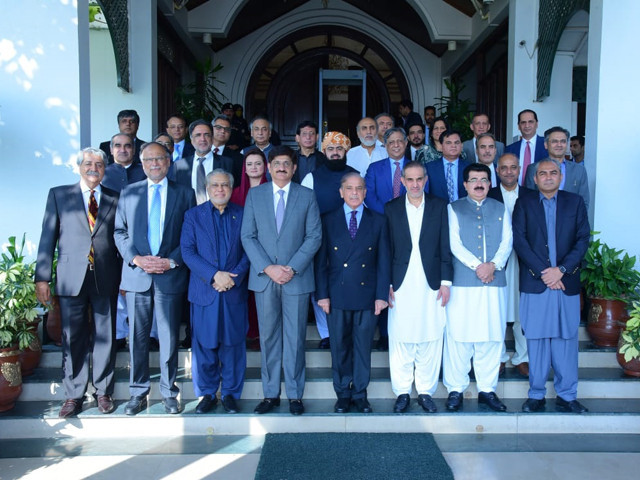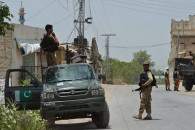Census green light raises poll delay fears
CII unanimously approved results of 7th headcount

The Council of Common Interest (CCI) unanimously approved on Saturday the results of the 7th population and housing census, concluding that the population of Pakistan has reached 241.49 million with a growth rate of 2.55% as reported by the Pakistan Bureau of Statistics (PBS).
The CCI’s 50th meeting was chaired by Prime Minister Shehbaz Sharif and attended by chief ministers of all provinces, three federal ministers and key leaders of the allied parties invited on special invitation.
The CCI decision is likely to result in a delay in general elections slated for November this year if the assemblies are dissolved on August 9, three days shy of their term completion. A new census means new delimitation of constituencies, which, according to some experts, may take at least four months.
Talking to a private news channel, Federal Minister for Law Azam Nazeer Tarar hinted at the possibility.
It is up to the Election Commission of Pakistan as to how much time it takes to complete the process of delimitation following the unanimous decision by CCI, Tarar said.
Referring to Article 51 of the Constitution, the law minister said general elections are held on the basis of the population in accordance with the last preceding census officially published.
He said the CCI meeting of 2021 with former premier Imran Khan presiding in the chair had also ruled that the next elections would be held on the basis of a new census.
Recalling that a constitutional amendment was made for conducting previous general elections, the law minister said: “It depends on how quickly the ECP completes the process of delimitation as the maximum outer limit [for holding elections after dissolution of a legislature] is of 120 days.”
Tarar said the number of National Assembly seats in provinces and Islamabad will remain the same and the census will have no impact on the number of constituencies in each province.
However, he said, the purpose of delimitation is to ensure that size of constituencies roughly remains the same, adding that the new census may result in formation of new constituencies in urban centers.
Read: Poll delay: PM adds grist to rumour mill
Tarar said the 120-day outer limit of delimitation could effectively be squeezed a bit, adding that 54 days are then required for holding elections.
“I think if we look at both the things together then roughly two to two-and-a-half months can maximally be added in the 90 days’ period and things shouldn’t go beyond that,” Tarar said, apparently confirming the delay in the next general elections.
Explaining how seats of the National Assembly would remain unchanged, Tarar said the provisional results were forensically reviewed and things have already been corrected, emphasizing that census results will have no impact on NA seats now.
To a question, Tarar said there will be no need to give any legal cover to the interim setup’s tenure even if it goes beyond the 90-day period given in the Constitution, saying Article 254 allows extending caretaker setup’s tenure if there is any delay in holding polls.
“It is the responsibility of the caretaker setup to hold elections,” he said “the caretaker stays until the elections are not held.”
The CCI’s unanimous decision and the law minister’s comments that there will be a delay in holding polls have exposed the double standards of the Pakistan Peoples Party (PPP), the second largest party in the ruling coalition.
The PPP has been publicly stating that polls should not be delayed for even a single day but the Sindh chief minister, who belongs to the PPP, gave approval for the CCI decision, apparently supporting a delay in polls.
Limit population growth: PM
A statement issued by the PM Office said the four provincial ministers and the representatives of all political parties completely agreed with the results of the census.
Dr Khalid Magsi of the Balochistan Awami Party, Syed Aminul Haque of the Muttahida Qaumi Movement, Maulana Asad Mehmood of the Jamiat Ulema-e-Islam and Qamar Zaman Kaira of the PPP besides the members of CCI attended the meeting on special invitation.
In his remarks, the prime minister said the CCI was an important constitutional institution for strengthening the federation and the first digital census in Pakistan was completed in the best manner which was a good step for the country.
He said all national institutions and provincial governments should take emergency steps to stop the increase in population. In the last six years, he said, the population grew by 3.5crore which was a matter of concern as the rate of population growth was more than the economic growth of Pakistan.
The PM said the rise in population created different kinds of difficulties for people and it would be a huge challenge for the next elected government of Pakistan and in the future.
“We not only have to stop the increase in population but would have to enhance economic growth to overcome various challenges," he remarked.
“The limited resources of the country are insufficient for the rising population,” PM Shehbaz said.
“If the population increases at the same rate, then despite our best efforts, poverty and unemployment will increase in Pakistan. So in order to secure our future, we have to take steps to stop population growth and to ensure progress and prosperity of the present population.”
Numbers
The officials of the planning ministry and the PBS gave a detailed briefing about the results of the census and the methodology used in it to the CCI participants.
According to the 7th census, the total population of Pakistan is 241.49 million and the annual population growth is at 2.55%. With 3.2%, the population growth in Balochistan was more than other provinces.
The digital census continued from March 1, 2023 to May 22, 2023 while the survey after data collection was held from July 8 to 19. The population of Khyber Pakhtunkhwa was recorded at 40.85 million, the population of Punjab at 127.68 million, Sindh 55.69 million, Balochistan 14.89 million and the population of Islamabad was registered at 2.36 million people.
According to these figures, the population of Khyber Pakhtunkhwa increased by 2.38%, Punjab 2.53%, Sindh 2.57% and Balochistan by 3.2%.
The meeting was told that the census was carried out by a census advisory committee which comprised prominent experts and it was headed by the deputy chairman planning commission, who as the president of the committee gave approval for the establishment of census monitoring committee and census advisory committee.
For the first time in the history of the country, they said, all stakeholders including provincial representatives were included in the census monitoring committee.
For the digital census, it was said, the National Database and Registration Authority (NADRA) provided software and 126,000 tablets, the National Telecom Corporation (NTC) gave data infrastructure and facilities of storage and computing while SUPARCO provided digital maps of the satellite in real time.
The provincial governments provided 121,000 personnel for conducting the census while the armed forces and law enforcement agencies ensured security for the personnel who were collecting data.
The meeting was told that on the recommendation of the census advisory committee, the CCI included all stakeholders in the process of census from the very first day.
For ensuring transparency in the process of data collection, during the census the provincial administration, civil society and education experts were made part of it.
The provincial chief secretaries and the district administration were given the facility of dashboards for monitoring the activities of the census all the time.
Largest digitization exercise of South Asia: PBS
According to the PBS, the 7th Population and Housing Census is historic, as this largest digitization exercise of South Asia was planned in the shortest span of time—just 18 months. Further, it said, for the first time Population of Pakistan was counted digitally using tablets.
For the first time, a facility of self-enumeration was provided to the citizens of Pakistan, the PBS said, adding this census has also provided an economic frame to determine the size of economic clusters across the country.
“All the structures have been geo-tagged,” the PBS said. Online monitoring dashboards were provided to stakeholders and all the above mentioned achievements make the first digital census a significant milestone and a huge leap towards digitization.
The census data helps governments to decide how to distribute funds and assistance to provinces, districts and localities. It is also used for re-appropriation of the National Assembly seats by drawing the lines of legislative districts, it added.



















COMMENTS
Comments are moderated and generally will be posted if they are on-topic and not abusive.
For more information, please see our Comments FAQ